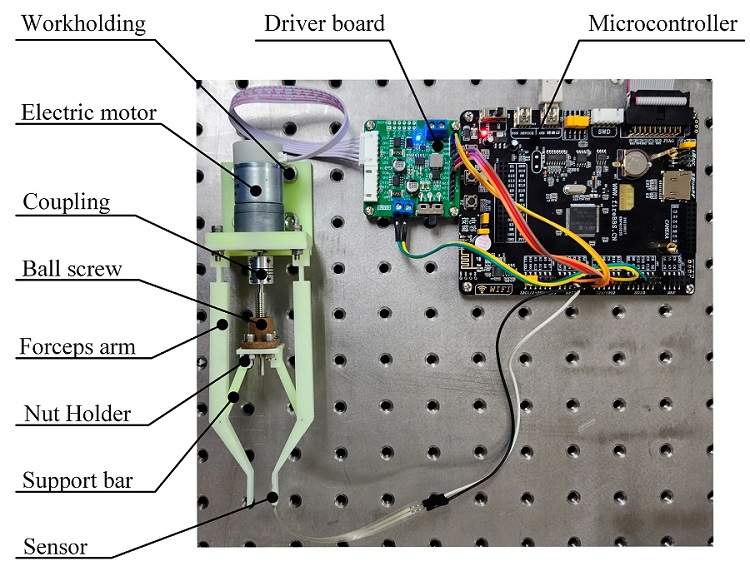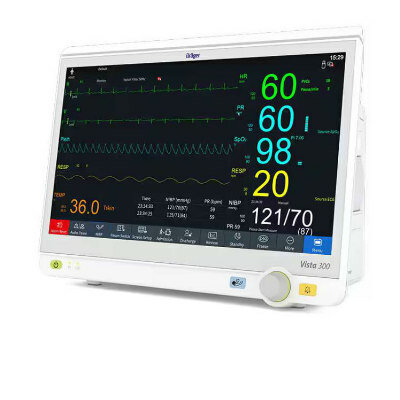New Surgical Forceps Enhance Precision and Reduce Surgeon Fatigue
|
By HospiMedica International staff writers Posted on 09 Dec 2024 |

Precision is a critical factor in the design of surgical instruments. Traditional surgical forceps often face challenges such as hand tremors and the nonlinear relationship between clamping force and operational force, which can reduce surgical accuracy. To address these issues, researchers have developed a novel type of hand-held surgical forceps with a force-holding function, aiming to improve clamping precision and reduce surgeon fatigue during lengthy procedures.
In their study published in Sensors, researchers from the Chinese Academy of Sciences (Beijing, China) conducted an in-depth analysis of the limitations of existing surgical forceps. They discovered that involuntary hand movements, such as tremors, adversely affected the precision of surgical tasks, and the absence of a feedback mechanism for force made it difficult for surgeons to gauge the clamping force applied to tissues, potentially leading to biomechanical issues. To address these limitations, the researchers designed a new surgical forceps incorporating a force-holding feature, allowing for better stability and control during surgery. The forceps' design was based on the lever principle to ensure effective clamping action. A kinematic model of the clamping mechanism was created using geometric methods, and its accuracy was validated through simulations using ADAMS software.
The researchers then performed a detailed stress analysis and developed a dynamic model to optimize the performance of the forceps. Finite element simulations were used to refine the design, ensuring that the forceps could endure the stresses experienced during surgical use. A prototype of the forceps was built, and an experimental platform was developed to evaluate the clamping force and stability under various conditions. The researchers used a silicone material to simulate human tissues in testing the forceps' effectiveness. They found that when the force-holding feature was engaged, the contact force between the forceps and the silicone tissue remained stable and closely aligned with the target clamping force. In contrast, when the force-holding function was disabled, the contact force showed significant fluctuations. These results highlight the advantages of the new design.
The new forceps, by improving clamping accuracy and reducing physical strain on surgeons, can enhance both the safety and effectiveness of surgical procedures. The optimized fundamental frequency of the instrument, set higher than the frequency of physiological tremors, further ensures stability during use. This study not only addresses the immediate challenges faced by surgeons but also contributes to the broader effort to improve biomechanical compatibility between surgical instruments and human tissues. It emphasizes the need for ongoing innovation in medical technology, which ultimately leads to safer and more efficient surgical practices.
Latest Surgical Techniques News
- Intravascular Imaging for Guiding Stent Implantation Ensures Safer Stenting Procedures
- World's First AI Surgical Guidance Platform Allows Surgeons to Measure Success in Real-Time
- AI-Generated Synthetic Scarred Hearts Aid Atrial Fibrillation Treatment
- New Class of Bioadhesives to Connect Human Tissues to Long-Term Medical Implants
- New Transcatheter Valve Found Safe and Effective for Treating Aortic Regurgitation
- Minimally Invasive Valve Repair Reduces Hospitalizations in Severe Tricuspid Regurgitation Patients
- Tiny Robotic Tools Powered by Magnetic Fields to Enable Minimally Invasive Brain Surgery
- Magnetic Tweezers Make Robotic Surgery Safer and More Precise
- AI-Powered Surgical Planning Tool Improves Pre-Op Planning
- Novel Sensing System Restores Missing Sense of Touch in Minimally Invasive Surgery
- Headset-Based AR Navigation System Improves EVD Placement
- Higher Electrode Density Improves Epilepsy Surgery by Pinpointing Where Seizures Begin
- Open-Source Tool Optimizes Placement of Visual Brain Implants
- Easy-To-Apply Gel Could Prevent Formation of Post-Surgical Abdominal Adhesions
- Groundbreaking Leadless Pacemaker to Prevent Invasive Surgeries for Children
- Spectroscopy Technique Improves Surgery for Pediatric Epilepsy Patients
Channels
Critical Care
view channel
Ingestible Smart Capsule for Chemical Sensing in the Gut Moves Closer to Market
Intestinal gases are associated with several health conditions, including colon cancer, irritable bowel syndrome, and inflammatory bowel disease, and they have the potential to serve as crucial biomarkers... Read moreNovel Cannula Delivery System Enables Targeted Delivery of Imaging Agents and Drugs
Multiphoton microscopy has become an invaluable tool in neuroscience, allowing researchers to observe brain activity in real time with high-resolution imaging. A crucial aspect of many multiphoton microscopy... Read more
Novel Intrabronchial Method Delivers Cell Therapies in Critically Ill Patients on External Lung Support
Until now, administering cell therapies to patients on extracorporeal membrane oxygenation (ECMO)—a life-support system typically used for severe lung failure—has been nearly impossible.... Read morePatient Care
view channel
Portable Biosensor Platform to Reduce Hospital-Acquired Infections
Approximately 4 million patients in the European Union acquire healthcare-associated infections (HAIs) or nosocomial infections each year, with around 37,000 deaths directly resulting from these infections,... Read moreFirst-Of-Its-Kind Portable Germicidal Light Technology Disinfects High-Touch Clinical Surfaces in Seconds
Reducing healthcare-acquired infections (HAIs) remains a pressing issue within global healthcare systems. In the United States alone, 1.7 million patients contract HAIs annually, leading to approximately... Read more
Surgical Capacity Optimization Solution Helps Hospitals Boost OR Utilization
An innovative solution has the capability to transform surgical capacity utilization by targeting the root cause of surgical block time inefficiencies. Fujitsu Limited’s (Tokyo, Japan) Surgical Capacity... Read more
Game-Changing Innovation in Surgical Instrument Sterilization Significantly Improves OR Throughput
A groundbreaking innovation enables hospitals to significantly improve instrument processing time and throughput in operating rooms (ORs) and sterile processing departments. Turbett Surgical, Inc.... Read moreHealth IT
view channel
Printable Molecule-Selective Nanoparticles Enable Mass Production of Wearable Biosensors
The future of medicine is likely to focus on the personalization of healthcare—understanding exactly what an individual requires and delivering the appropriate combination of nutrients, metabolites, and... Read more
Smartwatches Could Detect Congestive Heart Failure
Diagnosing congestive heart failure (CHF) typically requires expensive and time-consuming imaging techniques like echocardiography, also known as cardiac ultrasound. Previously, detecting CHF by analyzing... Read moreBusiness
view channel
Expanded Collaboration to Transform OR Technology Through AI and Automation
The expansion of an existing collaboration between three leading companies aims to develop artificial intelligence (AI)-driven solutions for smart operating rooms with sophisticated monitoring and automation.... Read more
















